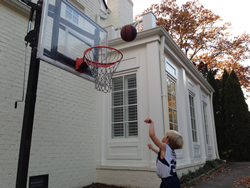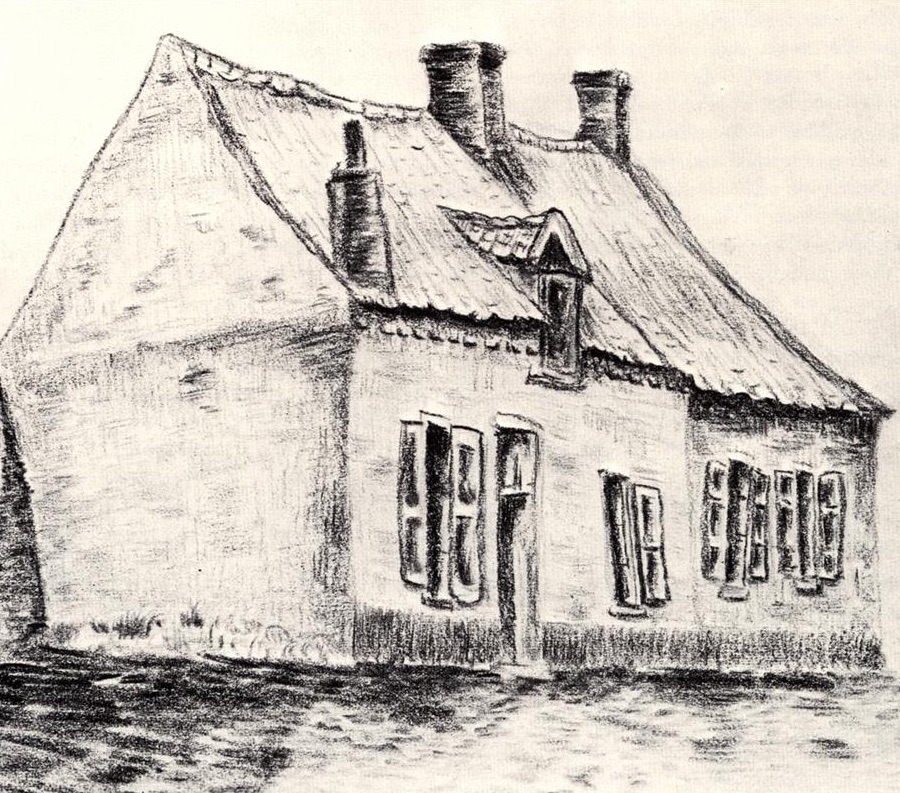Tiny Dreams
To learn to soar, sometimes all it takes is a hero
Growing up in Texas, I never had to be told that fall was the season of football. September and October, especially, meant McCallum High School’s games on Friday nights, the Longhorns on Saturday, and Roger Staubach on Sunday. Our family would schedule meals and even bigger events—birthdays, church confirmations, funerals—around televised kick-offs and Texas home games. I was an eager participant in the whole absurd parade, donning my Roosevelt Leaks jersey in the knothole of U.T.’s Memorial Stadium and wishing unspeakable evil upon the Philadelphia Eagles of Ron Jaworski and Harold Carmichael.
 But when Halloween rolled around, I would bid a subtle retreat from the football frenzy and indulge in my private world of basketball. My hobby wasn’t disgraceful or taboo, exactly, but it was an entirely personal diversion, one shared by none of my friends or family. In the days before nightly ESPN highlights, my hoops world was largely self-contained and conjectural. I had to invent for myself what Bob McAdoo looked like in the post or how Wes Unseld would create space with his rhinocerial ass—though I found that pinning my brother Ashby against the wall with my own skinny butt served as an effective illustration.
But when Halloween rolled around, I would bid a subtle retreat from the football frenzy and indulge in my private world of basketball. My hobby wasn’t disgraceful or taboo, exactly, but it was an entirely personal diversion, one shared by none of my friends or family. In the days before nightly ESPN highlights, my hoops world was largely self-contained and conjectural. I had to invent for myself what Bob McAdoo looked like in the post or how Wes Unseld would create space with his rhinocerial ass—though I found that pinning my brother Ashby against the wall with my own skinny butt served as an effective illustration.
While my friends played Nerf football in the street or debated Big Ten vs. Southwest Conference defenses, I’d bike over to Gullett Elementary with my first rubber, junior-sized balls and spend afternoons on the school’s asphalt courts accompanied only by the imaginative projections of my heroes. No one witnessed the games, but I never felt alone—not with the Phoenix Suns’ Walter Davis on my wing and Alvan Adams on the block, not playing defense against Havlicek’s Celtics or trying to match the ball-handling panache of the Knicks’ Walt Frazier. I’d check the box scores for my heroes—guys like David Thompson or Rick Barry—and then re-create their statistics, making the same number of field goals and free throws, high-fiving teammates when the game was complete.
November evenings in Austin, the sun would begin setting around 5:30, and a chill would leak into the air. My hands would go slightly numb, and my dribbling became increasingly sloppy. As the darkness fell, my shots moved from the perimeter to the paint, World B. Free jump shots giving way to James Silas bank shots, Kareem’s sky hooks, and finally, as night closed in, Moses Malone’s put-backs. At midcourt I would grant post-game interviews for the television crew and then dribble down Treadwell Avenue to the showers, waving to nonplussed neighbors in acknowledgement of their adulation.
Of all my NBA heroes (and their numbers are legion), the one who featured most prominently in my childhood fantasies was a player who seems to be forgotten today. In the 1971-72 season, when I was five years old and just beginning to learn about the beauty of basketball, Nathaniel “Tiny” Archibald led the NBA in scoring (34.0) and assists (11.4), a feat that has never been equaled, before or since. Tiny Archibald became a figure in the wider culture, in part because of his dazzling skills and in part, let’s admit it, because of his cool nickname. Tiny taught me how badass a short basketball player could be, and so “Tiny” I became on the hardtop courts of Austin, Texas.
I would try to dribble with my left hand, Tiny-style, eluding bigger defenders and soaring—yes, soaring—at the eight-foot baskets for improbable, twisting lay-ups. I imagined scenarios in which I’d play against Tiny, my team struggling to contain him, while his team, the Kansas City Kings, had no answer for my all-court brilliance. I never fantasized about out-scoring Tiny myself, but my team always won the games. I’d like to claim that as an eight-year-old I had a “team first” attitude, but the truth is more humble: even with no one watching but the passing traffic on Treadwell Boulevard, I couldn’t imagine out-playing my hero.
Eventually my loyalty swerved from Tiny and his high socks to the Philadelphia 76ers and George McGinnis, whose outrageous talent and superhero body made him the class of the NBA. I don’t recommend adopting McGinnis’s shooting style, but trying to replicate his one-handed free throw helped train my right elbow position better than any drill I learned at hoops camps. When I finally started playing in real leagues, heated indoor courts and wooden floors replaced the rough coldness of asphalt playgrounds, but I never forgot those fantasy games. As a seventh grader at Lamar Junior High School, warming up to play against O’Henry or Bedicheck, I’d imagine once again I was George Gervin facing off against Dan Issel’s Nuggets or, most often, I was Julius Erving in a lay-up drill, nonchalantly performing acrobatic sleights of hand, my elbows at rim level.
And in real games, those graceful, towering projections of my imagination were replaced by grimacing five-foot-two-inch guards and clay-handed forwards, and the grunting requirements of my defensive assignments relegated the dream scenes to the back of my mind. Still, on the bus rides home, as Lamar shrugged off yet another loss, I’d look out the window and see the press corps pressed around Dr. J’s locker, scribbling in notepads as I explained how the Sixers would learn from this loss and use it as motivation for the playoffs.
Those solitary NBA fictions, among the most vivid recollections of my pre-adolescent years, remain a part of me—they are the reason I get giddy when I see who’s playing on TNT Thursday nights and DVR every freaking playoff game and find myself suddenly bereft in late June when the NBA goes on its four-month hiatus. Even this past year, when the lockout eroded goodwill and fan loyalty, I still got intestinal flutters thinking about the NBA’s Christmas Day lineup. (Heat-Mavericks! Lakers-Bulls!)
Why, many of Nashville friends wonder, does a Texan-born, long-time Tennessean care about the NBA in November? They further ask why, when even fervent hoops fans care only about Miami, Boston, L.A., and maybe Oklahoma City, I stay up till midnight watching the Milwaukee Bucks and the Minnesota Timberwolves on the DVR. The answer is simple: Tiny Archibald is still out there, and he may appear in Milwaukee as readily as in L.A. The only way to know is to watch. And so I watch, all the while remembering Tiny and his beautiful running scoop shots, a brazen youth who played himself out of the Bronx and became an idol for another short guy: a kid in Austin who spent countless hours alone on the playground, wanting nothing more in the world than to know what it was like to be Tiny.
Copyright (c) 2012 by Sean Kinch. All rights reserved. Sean Kinch lives in Nashville, where he teaches English literature at Montgomery Bell Academy.

